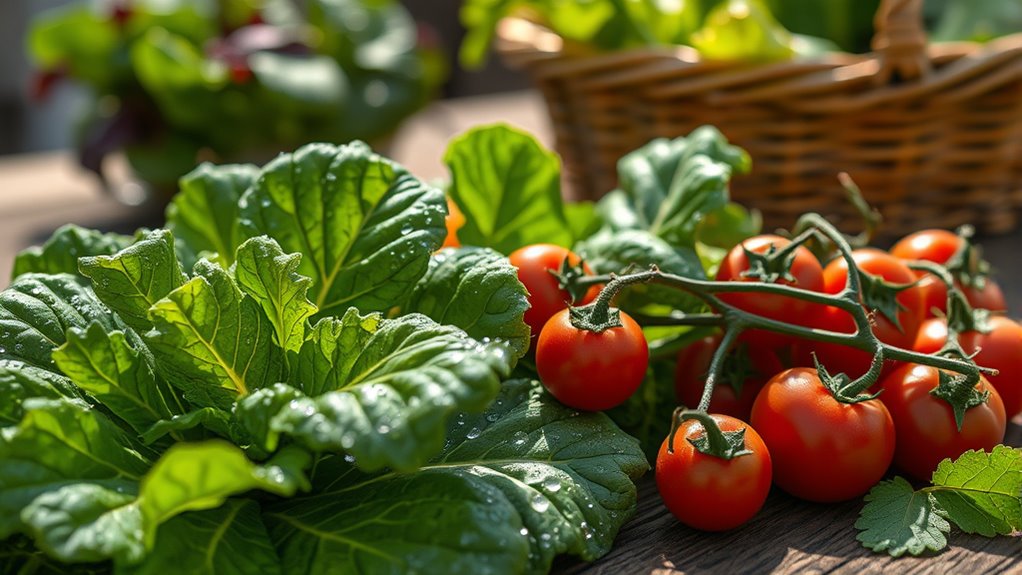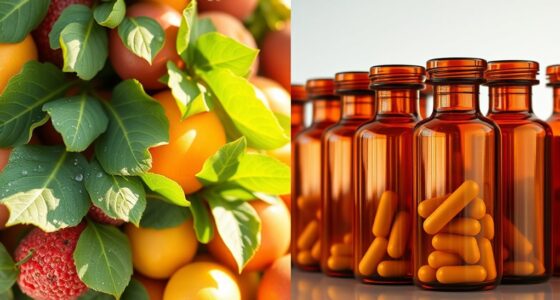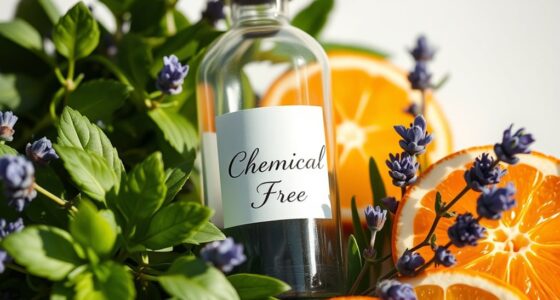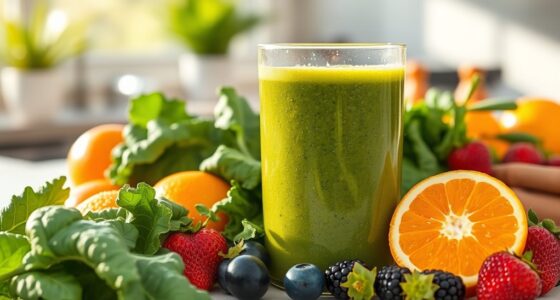Many believe organic foods contain no chemicals, but that’s a misconception. Organic farming limits synthetic pesticides and fertilizers, yet natural pesticides and chemicals from the environment can still be present. These residues often come from air, water, and soil exposure, not farm treatments. So, while organic foods often have fewer synthetic additives, they aren’t entirely chemical-free. To understand what this really means and what you should expect, keep exploring the facts behind organic standards.
Key Takeaways
- Organic foods limit synthetic chemicals but can still contain natural or environmental chemicals present on the farm or in the environment.
- The term “chemical-free” is misleading; all foods, including organic, naturally contain chemicals, some from natural plant compounds or environmental exposure.
- Organic standards prohibit artificial preservatives but permit natural pesticides, which are chemicals derived from plants or minerals.
- Many chemicals found in organic produce are naturally occurring or environmentally sourced, not necessarily harmful synthetic substances.
- Recognizing that organic foods often have fewer synthetic additives, but they are not entirely free of chemicals due to natural and environmental factors.
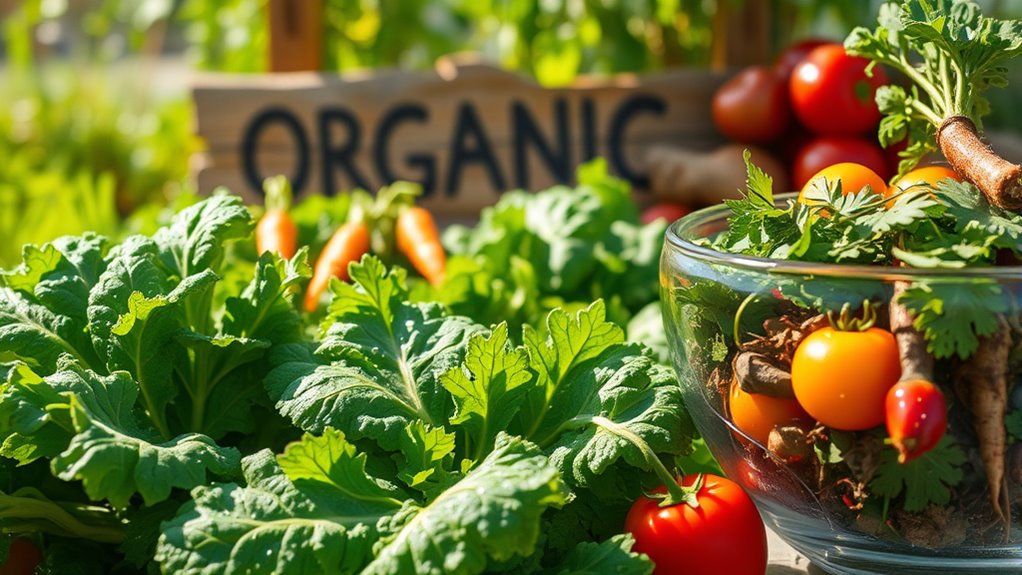
Many people believe that organic foods are completely free of chemicals, but this is a misconception. While organic standards limit the use of synthetic pesticides and fertilizers, they don’t guarantee that the food contains no chemical substances at all. Instead, organic farming primarily emphasizes natural processes and ingredients, but pesticide residues can still be present on organic produce. These residues often come from environmental exposure, such as air or water pollution, rather than direct application by farmers.
A new sentence could be: This means that even organic foods can carry environmental chemical residues, which originate outside of the farm but can settle on the produce.
As a result, organic fruits and vegetables might still carry small amounts of chemicals, which can be confusing for consumers expecting “chemical-free” food.
It’s also important to understand that not all chemicals are harmful. Many synthetic additives used in conventional food production are strictly regulated and have undergone extensive safety testing. Organic foods, on the other hand, generally avoid synthetic additives like artificial preservatives, colorings, and flavorings. This avoidance is a key reason many people choose organic, believing it’s healthier or more natural.
However, the absence of synthetic additives doesn’t mean the food is completely free of all chemicals. Natural substances, such as certain plant compounds, can act as preservatives or flavor enhancers naturally, and these are often present in organic products.
Furthermore, the idea that organic foods contain no chemicals can lead to unrealistic expectations. Chemicals are everywhere—present in the soil, water, and air—and plants naturally produce a variety of compounds, some of which are classified as chemicals. Organic farmers may use natural pesticides derived from plants or minerals, which are also chemicals, to protect their crops. natural pesticides are considered safe and are regulated, but they are still chemicals.
These natural pesticides are regulated and considered safe, but they’re still chemicals. Consequently, organic foods aren’t chemical-free, but they’re produced with a focus on natural and minimally processed ingredients.
Understanding this distinction helps you make more informed choices. Instead of chasing the myth that organic foods are chemical-free, recognize that they often contain fewer synthetic chemicals and additives. They’re grown with different standards that prioritize natural methods, but some chemical residues may still be present due to environmental factors.
Being aware of this can reduce misconceptions and allow you to appreciate the genuine benefits of organic foods without expecting them to be entirely devoid of chemicals. Ultimately, a balanced approach—acknowledging the presence of natural and synthetic chemicals—is key to making healthier, more informed decisions about what you eat.
Frequently Asked Questions
Are Organic Pesticides Safer Than Synthetic Ones?
You might think organic pesticides are safer than synthetic ones, but that’s not always true. Organic residue and pesticide residue can both remain on foods, and organic options aren’t free from chemicals.
While organic pesticides tend to be less toxic, they still have potential risks. It’s essential to understand that organic doesn’t mean chemical-free, and both types can leave residues.
Always wash your produce thoroughly, regardless of its origin.
Can Organic Foods Still Contain Harmful Bacteria?
Think of organic foods like a carefully maintained garden—they can still harbor harmful bacteria. Food safety is a priority, but bacterial contamination isn’t entirely eliminated by organic practices.
You should wash all produce thoroughly, just like you’d rinse fresh vegetables from any source. Organic doesn’t mean bacteria-free; it means fewer synthetic chemicals.
Do Organic Foods Have Longer Shelf Lives?
You might wonder if organic foods have longer shelf lives. Typically, their shelf life isn’t substantially different from conventional foods. Preservation methods like refrigeration, vacuum sealing, and proper packaging play a more vital role in extending freshness.
Organic produce may spoil faster if not stored correctly since they often lack synthetic preservatives. To maximize shelf life, focus on proper storage and handling techniques, regardless of whether the food is organic or conventional.
Are Organic Fertilizers Completely Chemical-Free?
Think of organic fertilizers as a carefully crafted recipe—each ingredient holds purpose. While they aren’t completely chemical-free, their chemical composition is natural, unlike synthetic options.
The fertilizer ingredients include compost, manure, or plant-based materials, which nourish plants without harmful chemicals.
How Do Organic Standards Vary Across Countries?
You should know that organic standards vary across countries, influenced by different organic certification and international regulations. While some nations have strict guidelines, others are more flexible, meaning what qualifies as organic can differ.
This variation affects farming practices, allowable substances, and labeling. When buying organic, it’s important to verify the certification and regulations in your country to guarantee the products meet the standards you trust.
Conclusion
Remember, believing organic food has no chemicals is like expecting a rainbow to be just one color. Every food, organic or not, is a tapestry woven with natural and chemical threads alike. Don’t be fooled by the illusion of purity—nature’s own recipe includes both the gentle and the potent. Instead of chasing a false perfection, embrace the vibrant complexity of real food, understanding that true health comes from balance, not from chasing an impossible, chemical-free dream.
